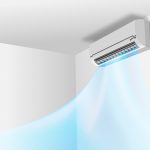By understanding how you handle air conditioner noise, you can finally enjoy peace during the day and a restful night’s sleep.
The impact of sound from an HVAC unit varies depending on the individual. Certain sounds and frequencies cause extreme sensitivity in some persons.
Some sounds are so loud that they cause hearing loss. The excessively loud noise might cause hearing damage over time.
The noise from the air conditioner is bothersome, but not painful. As a result, some people find it difficult to accept the premise that air conditioner noise poses a severe health risk. Despite this, AC noise might create more issues than you might imagine. As a result, you will need to figure out how to quiet a noisy air conditioner.
Continue reading to find out how to lessen air conditioner noise:
How To Reduce Air Conditioner Noise?
1. Location Is Everything
If you are installing a new HVAC system, you should carefully consider the location of your AC. Request that your technician put it away from bedrooms or other areas where you will spend a lot of time.
When you sleep in this location, the quantity of noise you hear will be reduced. It will also reduce the amount of noise that affects your day. The greater the distance between you and the source of the sound, the better.
Also, avoid placing the unit near air ducts or tight corridors. The sound of your air conditioner will be amplified as it bounces off the walls or small space. Consult your contractors about the best places to install your air conditioner.
Sound reflects off any smooth, hard surface. You should also collaborate with your contractor to identify a location away from your doors and windows for the installation.
Finally, work with your contractor to ensure that your air conditioner does not regularly cycle on and off. Continual cycling might create a lot of noise in your house.
2. Dirty Air Filters
How long has it been since you changed your air filters?
Here is why this is an issue: The heat and moisture from your home are absorbed by air conditioners. Water droplets fall into a drip pan as the moisture condenses inside the machine.
If the air filters are unclean, the condensation will freeze instead of dripping. Layers upon layers of ice will obstruct airflow, resulting in a loud buzzing sound from your air conditioner.
Change your filters once a month to solve this problem (more if you smoke, have allergy sufferers in your home, or if you have pets).
3. Fins With A Dirty Coil
Do you know how your air conditioner has a big box outside your house? (Or, if you live in an apartment, in the furnace closet.) That is the condenser unit you are looking at. If you look closely, you will notice what appears to vent on the side panels. Coil fins are what they are called. They will become caked in dust over time. And if they are on the outside of your house, grass, small leaves, or tiny branches will most likely become stuck in between them.
Once a year, turn off the electricity to your air conditioner (ideally from the breaker unit) and rinse them down. After that, straighten the coils with a condenser fin comb to their original position.
4. Air Ducts That Have Been Damaged
Air ducts can make your air conditioner sound like an angry rattling machine for a variety of reasons, including incorrect installation, incompatibility with your AC unit, leaks, or being covered in layers of dust. Schedule frequent HVAC repairs to avoid the last situation. The checks will not only keep your ducts in good shape, but they will also make your air conditioner function more efficiently, resulting in decreased energy expenditures.
5. Lubrication Is Required For The Motor
This is a problem with older models alone. Follow these instructions if you are on a limited budget. Before working on your air conditioner, make sure it is turned off. Because air conditioners work at such a high voltage, we recommend consulting an HVAC specialist to resolve this issue.
6. Your Air Conditioner Is Too Big For Your Home
You may have an air conditioner that is too big for the size of your home if you have variable temperatures in your home, high humidity indoors, and higher than typical energy expenditures in addition to a noisy machine. If it was recently installed, return it and consult an HVAC specialist to determine the number of BTUs (British Thermal Units) required for your home’s square footage.
7. It Is Time To Replace Your Air Conditioner
Nobody wants to be told that they need to replace their air conditioner. However, the average lifespan of an air conditioner is 15 to 20 years. It will last toward the higher end of the range if you maintain it regularly. After that period, you will find yourself in need of AC repairs regularly. The loud noises (combined with the age of your system) could be your air conditioner signaling that it is time for a replacement.
8. Make Sure The A/C Is Properly Installed
Make sure the air conditioner is properly fitted in a solid-wall window.
To minimize moisture collecting, it should be flat from side to side with a small lean toward the back. Also, make sure the machine is getting enough power.
If the wall is not solid, reinforce the brackets and supports. Ascertain that the equipment has been placed and secured following the manufacturer’s instructions. Any loose parts or fasteners that may rattle or vibrate should be tightened.
Make sure that all valves, seals, and weatherstripping are in place. Also, double-check that the side or top closure panels are securely fastened. Fill minor gaps or openings with spray foam or caulking. To eliminate vibrating noise, tighten nearby windows and, if necessary, apply new putty or caulking.
Bottom Line
Aside from a small humming when the system turns on and off, your air conditioning system should be relatively quiet when it is working properly. Keep in mind that when the unit is running outside, it will be noisy, but it should not make any weird or sharp noises.
To troubleshoot an unusually loud air conditioner, you must first determine which part of the system is causing the noise. When you cannot find the reason we recommend you to call a professional and check for the problem.







